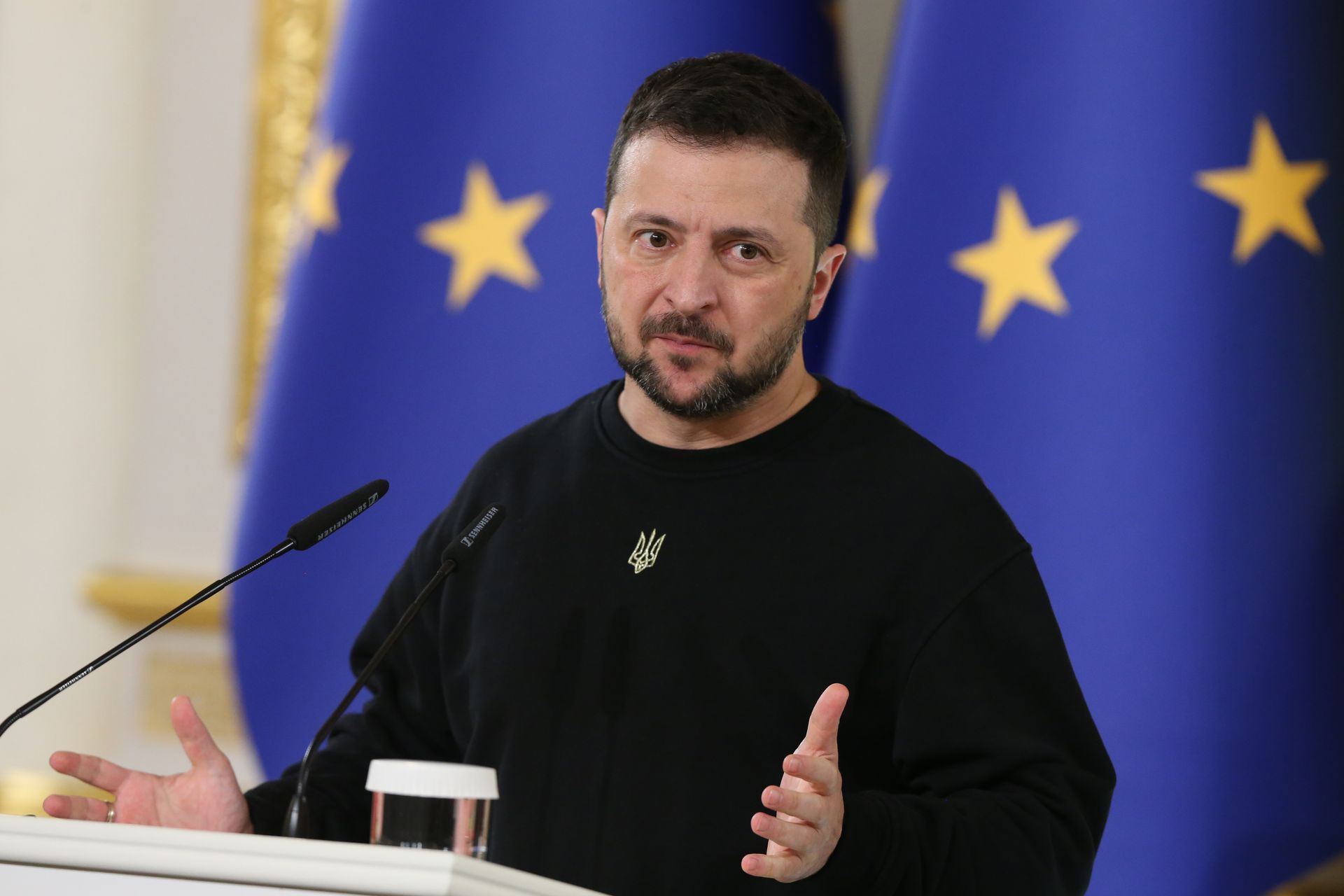Ukrainian parliament scrambles for votes to overturn contentious anti-corruption rollback
The ruling party appears to secure a slim majority to pass the bill that would walk back the gutting of anti-corruption institutions. Lawmakers and experts say it would come down to the wire.

Protesters hold placards during a rally against a law that restricts the independence of anti-corruption institutions in Kyiv, Ukraine on July 24, 2025. (Dan Bashakov/Global Images Ukraine via Getty Images)
Parliament passed a bill stripping the country's anti-corruption agencies of its independence, to the sound of applause. A week later, efforts to restore that independence would come down to the wire.
"By my estimate, we're currently in the 220–230 range, but that's a very risky zone," a Servant of the People lawmaker told the Kyiv Independent on condition of anonymity, referring to the upcoming July 31 vote on the president's bill that needs 226 votes to pass.
Despite having a majority on paper, the ruling Servant of the People party is in fact running a minority government — it lacks votes to pass any major bill on its own and is reliant on outside actors to push them through.
The July 22 law that gutted the independence of Ukraine's anti-corruption agencies — the National Anti-Corruption Bureau (NABU) and the Specialized Anti-Corruption Prosecutor's Office (SAPO) — was pushed through with the help of dubious political groups and sparked the first major protests since the start of Russia's full-scale war.
Among the factions that helped pass the contentious law were those that splintered from the now banned pro-Russian Opposition Platform — Restoration of Ukraine and Platform for Life and Peace. The other key supporter of dismantling anti-corruption agencies was the Batkivshchyna (Fatherland) faction, a group reminiscent of the country's politics of the early 2000s.

The three have 63 votes in total. None have been open to supporting the new presidential bill that is set to overturn the July 22 decision.
While the pro-European parties in opposition to the government — Holos and European Solidarity — are set to support the new bill, it all comes down to how many lawmakers from the governing party can be persuaded to make a U-turn.
"You know, it's very easy to destroy trust (in the leadership). Very easy. Restoring it is nearly impossible. And unfortunately, that's exactly the situation we're in now."
Another lawmaker from Zelensky's Servant of the People party told the Kyiv Independent on condition of anonymity that most members of the faction — without fully understanding the details — thought the July 22 bill came from the president and had been coordinated with American and European partners.
The same lawmaker told the Kyiv Independent that they received a phone call from those higher up, urging them to support the July 22 bill.
A third source within the president's party said that the authorities are now encouraging lawmakers to support the new bill, passing it as a request from Zelensky.
What is needed to pass the bill?
To pass a bill, Ukraine's parliament needs at least 226 votes.
At the beginning of his term in 2019, Zelensky's party held a super majority in parliament — 254 seats. Over time, the party began to struggle to secure enough votes, and after the full-scale invasion, the parliament faced a de facto crisis, fueled by a growing number of lawmakers resigning or leaving the parliamentary faction.
Despite holding 231 seats, Servant of the People usually lacks votes within the faction due to inconsistent attendance. According to Vita Dumanska, leader of the political watchdog Chesno, the Servant of the People party typically provides fewer than 200 votes on average, meaning it must seek an additional 30 to 40 votes from outside the faction to pass most bills.
To make up for the shortfall, Zelensky's party relies on former members of the banned Russian-linked Opposition Platform — For Life who changed their approach to voting after the outbreak of full-scale war.
Some lawmakers and experts suggest that the remnants of the pro-Russian groups in parliament help Zelensky's party stay afloat by voting for controversial bills in exchange for favors.
"The issue here goes a bit deeper than just this law. What is this cooperation based on? Is it pressure, coupled with vague promises not to touch them, not to pursue criminal charges, not to interfere or put pressure on their business? Or are there other kinds of benefits involved?" Dumanska said.

The July 22 bill was supported by several pro-Russian lawmakers, and it remains unclear whether they will back the president's new version, Dumanska said.
Additionally, 24 lawmakers who supported the bill on July 22 are themselves under criminal investigation, including by the institutions they gutted, Chesno reported. Most of the cases are still ongoing.
Whether they will support the new legislation aimed at restoring institutional independence of the National Anti-Corruption Bureau remains uncertain.
Batkivshchyna, led by former Prime Minister Yulia Tymoshenko and holding 24 seats in parliament, has announced it will not support Zelensky's bill. The party previously backed efforts to strip NABU and SAPO of their independence.
Meanwhile, the 19-member Holos faction signaled its willingness to back the president's proposal. It's unclear if the European Solidarity, with 27 lawmakers, is ready to join them in full.
Is Zelensky's faction ready to back the bill?
Four members of the Servant of the People faction who spoke with the Kyiv Independent believe the bill will be passed — two expressed confidence, and another two were more cautious.
One lawmaker, speaking anonymously, said some of his colleagues are hesitant to support the bill out of fear of retaliation from anti-corruption agencies.
"(Others) are angry because they were used, and now they are also being made the scapegoats, and then there are those who would prefer to surrender to the Russians," the source told the Kyiv Independent.
One lawmaker who voted in favor of the previous law said that there's now a rift in the presidential party.
"You know, it's very easy to destroy trust (in the leadership). Very easy. Restoring it is nearly impossible. And unfortunately, that's exactly the situation we're in now," the lawmaker said.
They added that growing mistrust toward the government among members of the ruling faction could lead to a more "independent" parliament.

Following Zelensky's submission of the new bill, several lawmakers have publicly apologized and sought to explain their earlier votes that undermined the independence of Ukraine's anti-corruption agencies.
The lawmaker said that many of their colleagues feel they were "misled." Despite this, the lawmaker affirmed their support for Zelensky's latest proposal and believes that most MPs who backed the previous legislation are now ready to endorse the new bill.
"I think there will be around 300 (votes)," the source said. "I'm confident that common sense and the instinct for self-preservation — both of the parliament and individual lawmakers — will play their part."
Another lawmaker from the ruling party, Fedir Venislavskyi, echoes this sentiment.
"I think our faction will vote in favor, with a few possible exceptions," he told the Kyiv Independent.
As of July 29, the governing party was still in talks to secure the required votes.
What if the bill doesn't get enough votes?
The parliament's Law Enforcement Committee unanimously supported the president's bill on July 30 in the first and final reading, setting it up for a vote in parliament.
If the bill falls short by just a few votes, it could be put to a repeated vote, Dumanska said, or an alternative version of the bill might be presented instead. As of now, six alternative bills have been registered.
"I think they (lawmakers) should have the conscience not to let us even talk about the possibility that this law won't be adopted. I really want to hope that after all it will be passed," says Dumanska.
"Because for the country, the consequences would be catastrophic — not only in terms of international aid, but also in terms of the internal resistance that exists within society."
Note from the author:
Hello there! This is Kateryna Denisova, the author of this piece. I hope you found this article informative. Please consider supporting our reporting. We promise to deliver more stories on this topic going forward.











